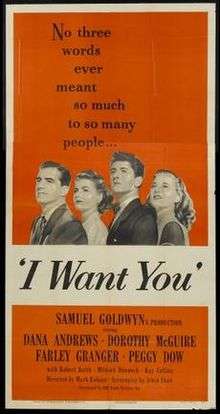I Want You (1951 film)
I Want You is a 1951 film directed by Mark Robson taking place in America during the Korean War.[2] The film was nominated for the Academy Award for Best Sound (Gordon E. Sawyer).[3][4][5]
| I Want You | |
|---|---|
 | |
| Directed by | Mark Robson |
| Produced by | Samuel Goldwyn |
| Screenplay by | Irwin Shaw |
| Starring | Dana Andrews Dorothy McGuire |
| Music by | Leigh Harline |
| Cinematography | Harry Stradling |
| Edited by | Daniel Mandell |
Production company | |
| Distributed by | RKO Radio Pictures |
Release date |
|
Running time | 102 minutes |
| Country | United States |
| Language | English |
| Box office | $1.5 million (US rentals)[1] |
Plot
In the "early summer of 1950", Martin Greer owns a small construction company. An Army combat engineer for four years during World War II, he and wife Nancy have two young children. Employee George Kress asks Martin to write a letter to the Selective Service System stating that his son, George Jr., is "indispensable" for their company and thus exempt from the draft. Martin refuses, and George Jr. joins the Army as the Korean War begins.
Martin's younger brother Jack is in love with college student Carrie Turner, daughter of a judge who is on the local draft board. Despite a trick knee he is drafted; Jack suspects that her father, who opposes their relationship, is the reason. Jack and Martin's mother, who lost a son during the last war, asks Martin to write an "indispensable" letter for his brother; he seriously considers it but does not do so, and Nancy criticizes Jack for his reluctance to serve. Jack joins the Army, where he briefly sees George Jr. before the latter goes to Korea.
The Army reports that George Jr. is missing in action, and his father drunkenly blames Martin. Martin's former superior, who has rejoined the military, asks Martin to join him; although eligible for exemptions, he agrees. Jack and Carrie marry during a furlough before he also goes overseas.
Cast
- Dana Andrews as Martin Greer
- Dorothy McGuire as Nancy
- Farley Granger as Jack
- Robert Keith as Thomas Greer
- Peggy Dow as Carrie Turner
- Mildred Dunnock as Sarah
- Martin Milner as George Kress, Jr.
- Jim Backus as Harry
Reception
Leonard Maltin gives the film three out of four stars, describing it as “Dated yet still touching Americana detailing effects of the Korean War on a small-town family. An artifact of its era, with fine performances all around. “[6]
At the time of its release, The New York Times' Bosley Crowther was not pleased: “All in all the running crisis of the "cold war" has been absorbed in the cotton padding of sentiment. A straight recruiting poster would be more convincing and pack more dramatic appeal.”[7]
References
- 'Top Box-Office Hits of 1952', Variety, January 7, 1953
- McKay, James (2010). Dana Andrews: The Face of Noir. McFarland. p. 123. ISBN 9780786446148. Retrieved 17 June 2019.
- "The 24th Academy Awards (1952) Nominees and Winners". oscars.org. Retrieved 2011-08-20.
- Zimmerman, Steve (2010). Food in the Movies, 2d ed. McFarland. p. 163. ISBN 9780786455690. Retrieved 17 June 2019.
- Ferguson, Michael; Ferguson, Michael S. (2003). Idol Worship: A Shameless Celebration of Male Beauty in the Movies. STARbooks Press. p. 76. ISBN 9781891855481. Retrieved 17 June 2019.
- "I Want You (1951) - Overview - TCM.com". Turner Classic Movies. Retrieved 2020-03-05.
- Crowther, Bosley (1951-12-24). "THE SCREEN IN REVIEW; Samuel Goldwyn's 'I Want You' Opens Run at Criterion-- Script by Irwin Shaw". The New York Times. ISSN 0362-4331. Retrieved 2020-03-05.
External links
- I Want You on IMDb